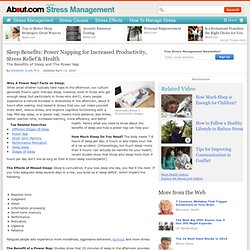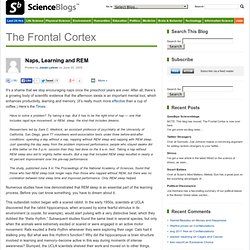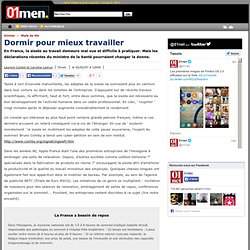

Power Napping for Increased Productivity, Stress Management and Health - Take a Power Nap - Power Nap and The Benefits of Sleep. Why A Power Nap?

Facts on Sleep: While small children typically take naps in the afternoon, our culture generally frowns upon mid-day sleep; however, even in those who get enough sleep (but particularly in those who don’t), many people experience a natural increase in drowsiness in the afternoon, about 8 hours after waking. And research shows that you can make yourself more alert, reduce stress, and improve cognitive functioning with a nap. Mid-day sleep, or a ‘power nap’, means more patience, less stress, better reaction time, increased learning, more efficiency, and better health.
Here’s what you need to know about the benefits of sleep and how a power nap can help you! How Much Sleep Do You Need? The Effects of Missed Sleep: Sleep is cumulative; if you lose sleep one day, you feel it the next. How Long Should I Sleep? Many experts advise to keep the nap between 15 and 30 minutes, as sleeping longer gets you into deeper stages of sleep, from which it’s more difficult to awaken. Naps, Learning and REM : The Frontal Cortex.
It’s a shame that we stop encouraging naps once the preschool years are over.

After all, there’s a growing body of scientific evidence that the afternoon siesta is an important mental tool, which enhances productivity, learning and memory. (It’s really much more effective than a cup of coffee.) Here’s the Times: Have to solve a problem? Try taking a nap. Numerous studies have now demonstrated that REM sleep is an essential part of the learning process.
This outlandish notion began with a scared rabbit. Years later, Case H. The breakthrough came in 1972, when psychologist Jonathan Winson came up with a simple theory: The rabbit brain exhibited the same pattern of activity when it was scared and when it was dreaming because it was dreaming about being scared. Winson’s theory was ridiculed. Whatever the elegance of Winson’s theory, he lacked conclusive evidence. Vive la Sieste ! Sommeil naturel, repos, roupillon, méridienne. La sieste au travail face au stress et aux risques psychosociaux – mode-sieste.com – en entreprise, au bureau. La sieste au travail: un spécialiste en parle. Dormir pour mieux travailler. 01net. le 02/02/07 à 12h00 Taxés à tort d'oisiveté malveillante, les adeptes de la sieste ne somnolent plus en catimini dans leur voiture ou dans les toilettes de l'entreprise.

S'appuyant sur de récents travaux scientifiques, ils affirment, haut et fort, entre deux sommes, que la sieste est nécessaire au bon développement de l'activité humaine dans un cadre professionnel. En clair, ' roupiller ' vingt minutes après le déjeuner augmente considérablement le rendement. Un constat qui intéresse au plus haut point certains grands patrons français, même si ces derniers accusent un retard conséquent vis-à-vis de l'étranger. Dans les années 90, Apple France était l'une des premières entreprises de l'Hexagone à aménager une salle de relaxation. La France a besoin de repos Or, les résultats d'une enquête menée par TNS Healthcare, à l'occasion de la 6e journée nationale du sommeil du 15 mars 2006, révèlent que 28 % des Français souffrent de troubles du sommeil.
Une sieste constitutionnelle ? Culture sieste - les différentes pratiques dans le monde. France Télécom adpote la sieste après la déjeuner. 02.22.2010 - An afternoon nap markedly boosts the brain’s learning capacity. If you see a student dozing in the library or a co-worker catching 40 winks in her cubicle, don’t roll your eyes.

New research from the University of California, Berkeley, shows that an hour’s nap can dramatically boost and restore your brain power. Indeed, the findings suggest that a biphasic sleep schedule not only refreshes the mind, but can make you smarter. Students who napped (green column) did markedly better in memorizing tests than their no-nap counterparts. (Courtesy of Matthew Walker) How to nap. Uberman 1 : fin de l'expérience. Naps, Learning and REM : The Frontal Cortex. How to Get the Nap You Need.